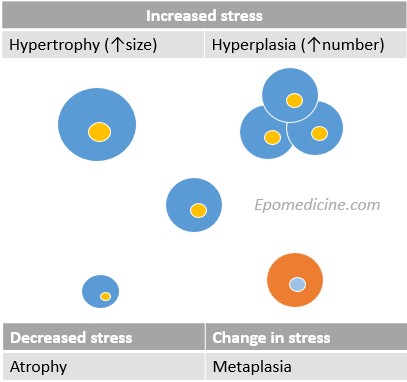Hypertrophy, Hyperplasia, Atrophy and Metaplasia are the main four types of cellular adaptations. Adaptations are:
- Reversible changes
- In the number, size, phenotype, metabolic activity or functions of cells
- In response to the changes in the environment (stress).
Hypertrophy
Definition: Increase in cell size
Occurs in: non-dividing (permanent) cells: cardiac and skeletal muscle, nerves
Types:
- Physiological – skeletal muscle in body-builders
- Pathological – enlargement of cardiac muscle due to hypertension
Molecular Mechanism: Gene activation, protein synthesis and production of organelles
Hyperplasia
Definition: Increase in the number of cells
Occurs in: cell population is capable of replication
Types:
- Physiological:
- Hormonal: increases functional capacity when needed – eg.: proliferation of glandular epithelium of female breast at puberty and during pregnancy
- Compensatory: after damage or partial resection – regeneration of liver cells; remaining kidney undergoes compensatory hyperplasia after unilateral nephrectomy
- Pathologic: caused by excessive hormonal or growth factor stimulation
- Endometrial hyperplasia: oestrogen and progesterone disbalance
- Skin wart: papillomavirus infection
Hyperplastic process remains controlled while in cancer growth mechanism is uncontrolled; but pathologic hyperplasia can result in cancer.
Molecular Mechanism: New cells from stem cells
Atrophy
Definition: Shrinkage in the size of the cell by loss of cell substance
Atrophy results from:
a. Decreased protein synthesis: due to reduced metabolism
b. Increased protein degradation in cells: by ubiquitin-proteasome pathway
Causes of Atrophy:
- Decreased workload (Atrophy of Disuse) – limb atrophy after immobilization for fracture
- Loss of innervation (Denervation atrophy) – thenar muscle atrophy after media nerve injury
- Diminished bood supply – atherosclerosis of vessels with aging leads to cerebral atrophy
- Inadequate nutrition – marasmus
- Loss of endocrine stimulation – loss of estrogen stimulation after menopause results in atrophy of endometrium, vaginal epithelium and breast
- Aging (senile atrophy) – cell loss in brain and heart
- Pressure – enlarging benign tumour can cause atrophy in surrounding compressed tissues
Molecular Mechanism:
- Ubiquitin-proteosome pathway: degradation of intermediate filaments of the cytoskeleton
- The cytoskeleton is a structure that helps cells maintain their shape and internal organization, and it also provides mechanical support that enables cells to carry out essential functions like division and movement.
- Autophagy of cellular components: generation of autophagic vacuoles which fuse with lysosomes to breakdown cellular components
Metaplasia
Definition:
- Reversible change in which
- One adult cell type (epithelial or mesenchymal) is replaced by another adult cell type
- Resulting from a change in stress – such that
- Metaplastic cells can better handle the new stress.
a. Squamous metaplasia: result of chornic irritation –
- Chronic smoker – ciliated columnar epithelium of trachea and bronchi are replaced by stratified squamous epithelial cells
- Vitamin A deficiency – squamous metaplasia in respiratory epithelium; replacement of thin squamous conjunctival lining with stratified keratinizing squamous epithelium (keratomalacia)
- Squamo-columnar junction of cervix – to hormone changes
Although the metaplastic squamous epithelium has survival advantages, important protective mechanisms are lost – eg. loss of mucus secretion due to squamous metaplasia of respiratory tract.
b. Columnar metaplasia:
- Barrett esophagus – non-ciliated, mucin producing columnar metaplasia of distal esophagus (normally lined by nonkeratinizing squamous epithelium suited to handle friction of food bolus) due to chronic gastroesophageal acid reflux.
c. Myeloid metaplasia:
- Proliferation of hematopoietic tissue outside bone marrow, eg. liver and spleen
- Occurs in chronic idiopathic myelofibrosis
d. Connective tissue metaplasia:
- Formation of cartilage, bone, or adipose tissues that normally do not contain these elements
- Example – myositis ossificans (muscle changes to bone during fracture healing)
May lead to cancer – eg. Barrett esophagus may lead to adenocarcinoma of esophagus
Molecular Mechanism:
Reprogramming of stem cells to produce new cell types caused by changes in cell signals generated by mixture of cytokines, growth factors, and extracellular matrix components in cell matrix.
Other Similar Terms
Dysplasia:
- Not a true “adaptive process” but often arises from:
- Pathological hyperplasia (“atypical hyperplasia”): Endometrial hyperplasia
- Metaplasia: Barrett esophagus
- Disordered cellular growth – abnormal change in size, shape and organization of mature cells
- Often reversible with removal of inciting stress
- Pre-cancerous: Cervical Intraepithelial Neoplasia (CIN) is a precursor to cervical cancer
Hypoplasia: Decrease cell production during embryogenesis, resulting in small organ size, eg. gonadal structures in Klinefelter’s syndrome and Turner’s syndrome
Aplasia: Complete failure of cell production during embryogenesis, resulting in failure of organ development, eg. bone marrow aplasia, unilateral renal agenesis
